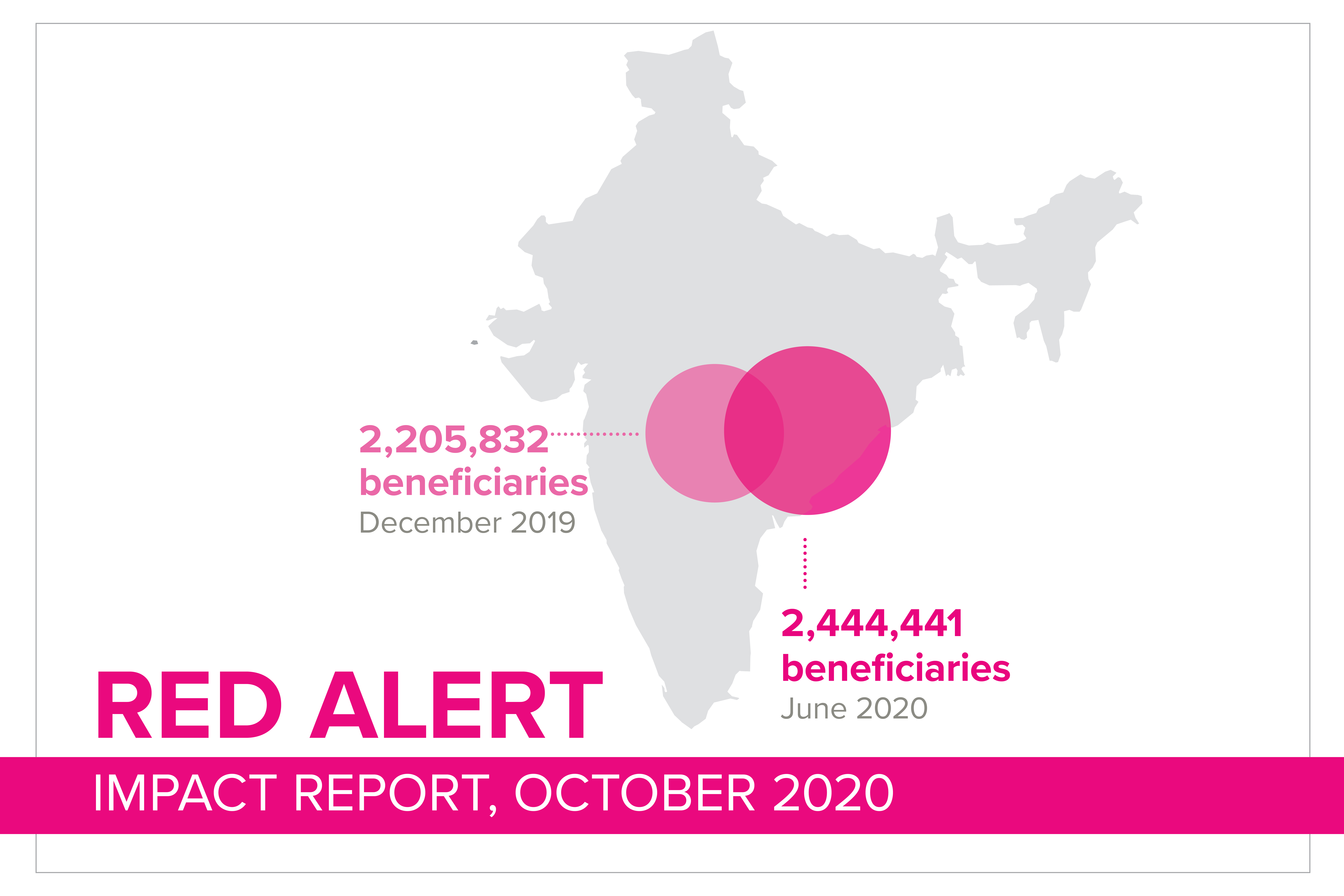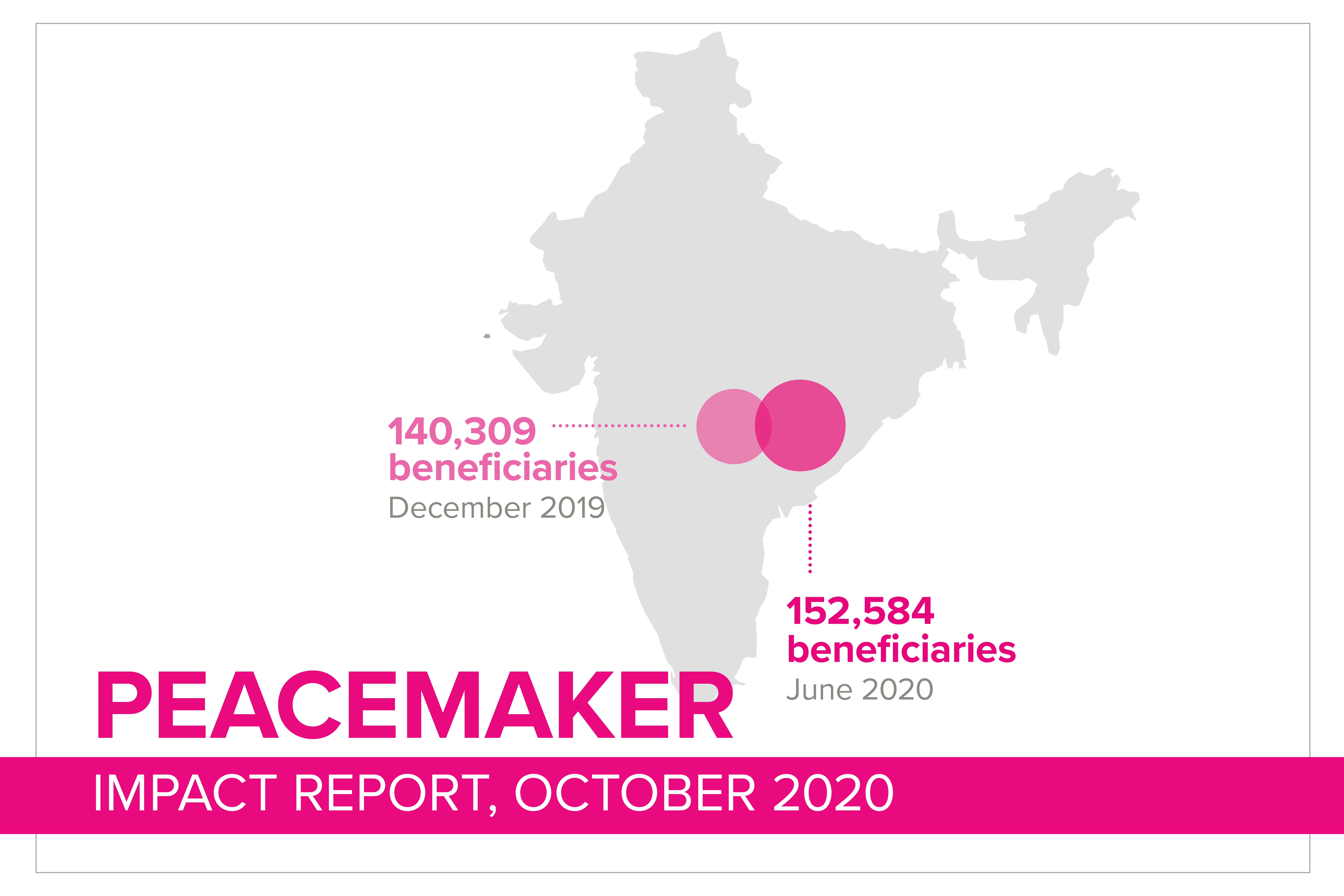of India’s most vulnerable villages
from safe village training
on the Red Alert helpline
Data to June 2020
Impact of COVID-19 on Safety programs
In India, COVID-19 lockdown was extended from March - June 2020 with supply chains being significantly disrupted. Consequently, regular program activities have been largely slowed or paused until lockdowns are lifted and Opportunity’s program partner began to focus on the urgent needs of people across the country. Since July, there have been tiered levels of restrictions depending on local cases and some inter-state transport is resuming.
Opportunity’s program partner has reported a sharp increase in the number of traffickers using technology — including social media platforms — to lure and trap unsuspecting victims, and an increase in the reported cases of domestic violence since the COVID-19 lockdown began. In response, they are providing increased access to counselling services and support for victims of abuse for the next 12 months, including the creation of a national counselling hotline for domestic violence. They are also building community awareness around COVID-19 alongside awareness of prevention of domestic violence and child trafficking.
During the lockdown, many people lost their source of income which made it difficult or impossible to purchase essential materials. Operation PeaceMaker provided for 12 women survivors of domestic violence by supporting them with immediate medical assistance, rent and other household needs.
Program Progress
Operation Red Alert

As part of the Operation Red Alert, the Safe Village Program is addressing trafficking in India by teaching vulnerable girls and their families how to identify and avoid human trafficking situations. Over the past six months, the number of individuals benefitting from Operation Red Alert has increased by 238,609, reflecting a slowdown in growth of beneficiaries from the previous six-months due to the interruption to normal program activities because of COVID-19 lockdown.
India’s first national helpline dedicated exclusively to handling human trafficking cases—advertised in high-risk villages through the Safe Village Program—received 43,410 calls for assistance. The helpline is a collaborative effort that includes some of India’s most reputable anti-trafficking organisations and helps to provide assistance to callers that would otherwise have nowhere else to turn.
Operation PeaceMaker

Operation PeaceMaker provides the knowledge and support required to help women and children live lives free from domestic violence and abuse. Over the past six months, the number of individuals benefitting from the PeaceMaker program increased by 12,275 individuals in these vulnerable communities, which is just over half the growth of the six-month period before. The slowed growth in beneficiary numbers is directly attributed to the interruption to normal program activities due to COVID-19 lockdown.
Training women to become PeaceMakers is the heart of the PeaceMaker program. While no new PeaceMakers were trained during this period, they continued to provide rights education and referrals to counselling forvictims of abuse and violence, empowering them to seek healthy solution. To date, 9,452 cases have been handled by PeaceMakers across India, as well as:
- 152,584 community members benefitting from violence prevention training
- 60 active PeaceMakers supporting their communities
Voice from the program
Reema's story
Reema has been married for twenty-eight years. During that time her life was characterized by abuse and financial instability. Her husband never financially supported Reema, and he was constantly suspicious of her. He also severely physically abused Reema.
In 2001, Reema filed a police complaint against her husband. He was also having an extramarital affair and regularly brought the woman to their home.
When Reema’s husband promised her he had changed, Reema believed him. Unfortunately, the abuse continued, as did his extramarital affairs.
Reema filed a complaint, which saw her husband detained, but he was let go a few days later. He began harassing her by stealing her property papers, her gold, and her savings. She no longer expected him to return to her or to the children, but she did expect that he would financially support their children.
Due to previous experiences, Reema did not entirely trust that the police could help her. Reema considered her husband a threat to her life and the lives of her children. He frequently threatened that he would take the children and give them to the woman he was having an affair with. Opportunity’s program partner’s legal team is currently helping Reema file a maintenance case. Because of the COVID-19 lockdown, Reema lost her job and was rendered financially unstable.
Opportunity’s program partner’s counsellor called Reema to enquire about her and her children. Reema shared that she was suffering with a leg injury and due to the lack of transportation and privacy because of the lockdown, she was unable to visit a doctor. This complicated health condition made it difficult to carry out daily activities, purchase groceries and run the household.
To help Reema survive these toughand turbulent times, INR3,000 (AU$57) was transferred to her account to help her run her household. Opportunity’s program partner also helped Reema procure a gas cylinder and purchase groceries for the family. The constant follow-up by Opportunity’s program partner provided Reema with psychological, emotional, and financial support. She is happy knowing that she and her children are now safe.
Case study
What drives the decision to send girls away from home?
In India, 78 per cent of girls trafficked into sex slavery are from West Bengal. Most of these girls are aged between 12 and 16 years and come from marginalised and vulnerable groups called scheduled castes or scheduled tribes. These communities experience high rates of poverty, illiteracy, and seasonal unemployment during monsoon.
The trafficking network in West Bengal is strong and resilient. Traffickers are patient and they usually use informants or colluders embedded in the community who select a household and appropriate time to approach them, such as during conditions of scarcity or a crisis such as crop failure, death of the breadwinner, or serious disease. Typically, they offer marriage or jobs in the city for their daughters, providing a false hope for the family’s future, relief from the suffering of the crisis situation, and releasing the economic burden of the girl child from an overburdened household. They might offer some upfront payment or pardon outstanding debt to lure the father to relinquish their daughters. The offer of a marriage from the city may even bring a sense of pride and prestige to the family.
In India, once married, wives become the husband’s responsibility and they become part of the husband’s household. It is not unusual for families to have no communication with their daughters after they are trafficked, so the story of their trafficking and poor living conditions never reaches their families or their home communities as a warning to others. Open conversations about incidents of child sex trafficking do not happen due to shame and stigma attached to the subject. Consequently, the villagers mistakenly perceive the risk of trafficking as low.
To reduce child sex trafficking, Opportunity’s program partner provided awareness education to vulnerable communities to sensitise them to the real dangers, alert them to the tactics employed by traffickers, and empower at-risk families to take action, such as calling the helpline, when they suspect someone is being targeted. They start conversations about the sensitive topic of child sex trafficking through public events like movie screenings, festivals and performances. They strengthen girls’ agency by communicating directly with girls at school and increasing their knowledge of At the same time, they approach parents through participatory homework assignments, questionnaires, and quizzes.
This project is supported by the Australian Government through the Australian NGO Cooperation Program (ANCP).
Impact Stories
Your support is empowering millions of women and children to live in safety, and training community members to take better care of the vulnerable. These are some of their stories.
For their safety, names have often been changed and locations generalised.

Elca Grobler, founder of My Choices Foundation, shared with us how the work of My Choices is helping make communities safer for women and children.

Gender-based violence - "the shadow pandemic"
For every three months of lockdown due to COVID-19, an estimated 15 million people—mostly women and girls—have suffered from gender-based violence, globally.

When a woman from their community came to Saidul with a marriage proposal for his 16-year-old daughter, Saidul thought it sounded like a good opportunity. Marriage preparations were well underway when Operation Red Alert’s Safe Village Program came to Saidul’s village.

"I discovered strength, independence and peace during my training."
– Maheshwari, India
Maheshwari runs awareness workshops throughout her local community and provides support to women who are experiencing domestic violence.